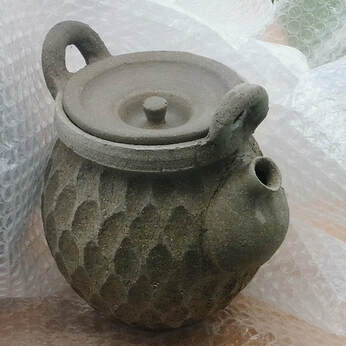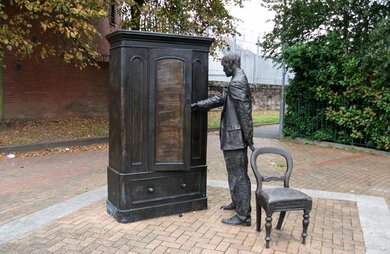 Pots- best china and everyday crockery One of the things that I find attractive about the craft of pottery is that it is about making something special out of the basic ’stuff of the earth’. Also, that the 'something special’ is more often an item of basic practical everyday use, in contrast to the ’Sunday best’ china or the ornate porcelain vase that is worth thousands of pounds. In the world of craft pottery every item bears the finger-marks of the maker. It is individual and it is special, while often being quite ordinary and for basic purpose. This prompts me to take more careful notice of the ‘ordinary’ in other areas of life, as it is very likely to hold aspects of the ’special’. People, in particular, may not stand out in a crowd for any reason, yet be ’special’ in so many ways, as created by the Divine Maker. Some everyday tasks will just be done in the course of things yet, if not done, would reveal an importance. Photos So many of the images we see in magazines etc. have been very carefully planned and posed, while most of those that we capture on our phones are very much ‘of the moment’ and capture the ordinary aspects of life. Much of life easily passes us by, but caught by the camera our attention is drawn and the special is revealed. We have two sets of wedding photos. The album created by a professional photographer carries the planned and posed while a collection of informal shots taken by a friend capture the really special moments that were probably not noticed at the time. It is this latter collection that is most special to us, as it captures something special about the day and those who were there. Andi Ashworth writes in the Art House America blog of how her mother and she record the ordinary, everyday. Many of her diary pages contain only the fragment of a sentence — “sewed and listened to baseball game.” Other pages report cleaning the house, having friends over for dinner, taking kids to the doctor, canning peaches, meeting with clients, watering the yard, cooking, ironing, keeping grandchildren, paying bills, running errands, going to meetings, and visiting neighbors. By keeping track of her daily life, she gave a cheerful dignity to all the particulars. … the words on the page gave me eyes to see the significance of the smaller things that are always present. Sure, there are high points, nameable moments of climax — but most of my daily life still takes place in the in-between. I live in grocery stores and farmer’s markets, at the stove and the kitchen sink. I pull weeds in the garden, sort the recycling, fold laundry, write e-mails, get the oil changed in the car, meet younger folks for coffee and long conversations, and sit for hours at my computer laboring over words and sentences. Along with the aid of my journals, perhaps it’s been easier for me to see how much the smaller things matter in the creation of a whole. Paula Gooder -Everyday God - Spirit of the Ordinary Ordinary Time is probably the soggiest season of all … I remain passionately convinced that we need to look again at a spirituality of ordinariness because without a proper understanding of the importance of ordinariness, our lives become an impoverished waiting room, as we loiter between one big event and another. What is important is the celebration of the ordinary in all its forms: in the lives of ordinary people; in a God who defies our best attempts to put him in a gilded palace; in a kingdom that is best likened to seeds, yeast and fishing nets, and in everyday decisions which, lived out with God have extraordinary consequences. The Bright Field - RS Thomas I have seen the sun break through to illuminate a small field for a while, and gone my way and forgotten it. But that was the pearl of great price, the one field that had treasure in it. I realise now that I must give all that I have to possess it. Life is not hurrying on to a receding future, nor hankering after an imagined past. It is the turning aside like Moses to the miracle of the lit bush, to a brightness that seemed as transitory as your youth once, but is the eternity that awaits you.
0 Comments
 'The Searcher' Sculpture by Ross Wilson - outside Holywood Rd Library, Belfast 'The Searcher' Sculpture by Ross Wilson - outside Holywood Rd Library, Belfast I guess that most have enjoyed CS Lewis’ ‘The Lion the Witch and the Wardrobe’, whether as book, film or play. Our childhood fascination with the ability to be transported from one world to another in an instant is fulfilled. Children playing with toys in an imaginary world are brought back to reality by tea or bed-time. Sometimes the transition is easy and at other times not – ‘Oh Mum, just let me finish the story ….’. Older ‘children’ delight in the likes of Dr Who – not just the time-travel and the not knowing where he might appear next, but also those almost unseen boundaries through which characters can step. Sometimes it happens in an instant, at others it involves light-years of spinning galaxies. The distance seems to matter little as the difference between two worlds remains. The different worlds can seem so close, yet are so far apart. One of the elements of these fictional creations that creates excitement is the uncertainty of what is to be found in the new situation. Is it a world of promise or danger? The children in CS Lewis’ creation discovered a land of wonder, but also of threat. It was a land of struggle and battle, but also a place where Aslan, the Christ figure, gave his life and gained life. Dr Who has become a little more predictable, in that there is always an enemy and always the ‘get out’ of another time-travel journey when the going gets tough! We sit on the edge of our seats in the meantime. For the child living in their imagination there may be the comfort of ‘imaginary friends’, but equally fearful elements can creep in and become quite real. In ‘real life’ we find similar boundaries that are created between ability or incapacity. We move home and in a different situation may find our lives more fulfilled, or not. The element of risk or struggle is there too. Some occurrence in our lives may move us into the world of the less able or disabled. Accident or illness may cause a lack of mobility or faculty such as sight or clarity of thought. We move in an instant or over a period of time into a different world, from our perspective. For all of us the transition between worlds that is caused by ageing cannot be avoided. I don’t imagine that it is easy for anyone, but for some it is a gradual process that can be taken step-by-step, while for others it comes quickly. The world we live in is shaped not so much by age, but by capability, physically and mentally. Boundaries exist for all of us - driving, travel, language, thought, imagination, physical height or flexibility, mobility, stairs etc. - and as we get older most boundaries seem to close in. Some gradually, but others quite suddenly. The occasion of moving into a Care Home is likely to happen quite suddenly or unexpectedly. It is usually governed by ‘events’ or ‘others’, but even if it is a rational and accepted decision our world changes drastically. ‘Our home’ is left behind for this new world of both prospect and uncertainty. We seek comfort, care and security, but in the strangeness of this new world we will likely feel very uncomfortable and insecure initially. We have travelled ‘through the wardrobe’ and, while we may not have entered a world of danger, it is a place of uncertainty with the necessity of it all blinding us to any hope or possibility that this new world might hold. Of necessity, the world of a Care Home is usually one of routine. This and the lack of human resources restricts opportunity for individual interests or activity. The boundary between independence and dependence is clearer than it might perhaps be, with the dominant characteristics of a Care Home being dependence and care. What is the Christian perspective on all this? We understand a life that is shaped by our physical and mental capabilities, but what of the spiritual life that is shaped, not by boundaries but by eternal life? The Biblical testimony speaks of many in the Old Testament who’s worth at great age was recognised, even to the point of providing leadership and offering wisdom. The Gospel account offers examples of many who’s lives were not shaped by capability – physical and mental illness and disabilities are overcome, boundaries of culture, religion, social standing and political influence are broken through and over all is the lived-through experience of Jesus Christ – of life that promises more than death. The reality for a Christian is of boundaries expanding infinitely, not closing in. This is the primary message that the Christian Church has to offer, but we struggle. THE CHURCH Although I would not want to push the analogy too far, I imagine that the Christian Church would see itself in the role of the wardrobe in The Lion the Witch and the Wardrobe. Here is the gateway to this other world, or rather this other world-view. As Christian communities we do seek to witness to a world where love, forgiveness and justice are the dominant values and to live it out within our church fellowships. The door, however, opens all too often onto that closed space where we meet for our worship and church activities. What then for those who have been valued members of the Christian family but find themselves needing to be in a Care Home? For the most-part we accept the ‘dependent-care’ culture of the Care Home and make it the Church’s way of working so, while we do wish to have a caring role, we tend to omit the obligation we have to enable those in Care-Homes to fulfil their part within the life of a community. A Christian who has grown up within and lived by a culture of love, giving and sacrifice finds themselves in a position of receiving and of care. What does this mean for their spiritual life? Do they not have something to contribute still? Their world has been shaped by capability, physical and mental, but what of the spiritual? THE CHURCH IS THE WARDROBE The challenge for the Church is to live the life it is witness to. To be the wardrobe that leads to Christ’s life of promise, rather than be a cupboard full of musty coats. To discover its presence beyond the ‘four walls’ and the traditional structures and practices. To enable those whose lives are naturally restricted by a different ‘four walls’ to live this same life that is spiritually free. Recently, there has been much talk of boundaries broken through the energies of the human spirit, as we have witnessed the Olympics and Paralympics. Christians witness to a life that reaches its fulfilment through the Spirit of Christ, the Holy Spirit of God. (Originally written in relation to the Generations Project - enabling the Church in Care Homes - in Solihull, West Midlands. 2013) |
Archives
March 2024
|
 RSS Feed
RSS Feed
